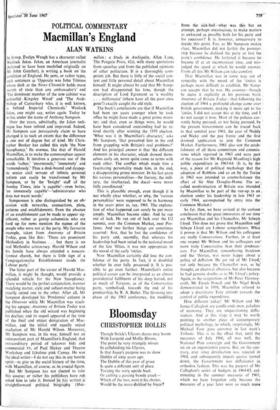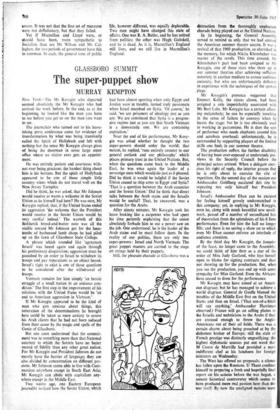Macmillan's England
POLITICAL COMMENTARY ALAN WATKINS
In Scoop, Evelyn Waugh has a character called Wenlock sakes. lakes, an American journalist (believed to have been modelled originally on Mr John Gunther), is writing a book on the condition of England. He pens, or rather types, such sentences as 'Opposite was John Titmuss whose desk at the News Chronicle holds more secrets of state than any ambassador's' and The dominant member of the new cabinet was colourful }Kingsley Wood' and 'The Arch- bishop of Canterbury who, it is well known, is behind - Imperial Chemicals.' Wenlock lakes, one might say, writes again. Today he writes under the name of Anthony Sampson.
Over the years, admittedly, the Jakes tech- nique has been refined and improved. Indeed, Mr Sampson can persuasively claim to have changed it to such an extent that the difference is one not of degree but of kind. Mr Chris-. topher Booker has called this style 'the New Sycophancy.' Its essence, like that of Harold Macmillan, is to make the commonplace appear remarkable. It involves a generous use of the words 'rather,"enormously,' 'immensely' and 'tremendously.' Thus a desk-bound and dyspep- tic senior civil servant of infinite personal tedium can easily be transformed by Mi Sampson, or by the 'Insight' staff of the Sunday Times, into 'a capable'even better; an immensely capable'—`administrator who does•not waste words.'
Sampsonese is also distinguished by an oh+ session with networks, connections, plots, patterns and establishments: Even the absence of an establisbnient can be made to appear sig- nificant,, rather as gossip columnists who are hard up for news mention the names Of the. people who were not at the party. My favourite example, taken from Anatomy of Britain Today, goes like this: 'There are prominent Methodists in business . . but there is no real Methodist aristocracy. Harold Wilson and his family have always attended a noncon- formist church, but there is little sign of a Congregationalist Establishment inside the Labour party.'
The latter part of the career of Harold Mac- millan, it might be thought, would provide .a. splendid vehicle for the New Sycophancy. There would be the perfect conjunction, manner matching matter, style and subject-matter being exactly Suited one to the other. After all, Mr Sampson developed his 'Pendennis' column in the Observer while Mr Macmillan was reach- ing his apogee; Anatomy of Britain Today was published when the old. wizard was beginning his decline; and its sequel appeared at the time of the final and unjust denigration of Mac- millan, . and the initial and equally unjust exaltation of Mr Harold Wilson. Moreover, Mr Sampson was, in his way, himself not an ' unimportant part of Macmillan's England, that extraordinary period of takeover bids and commercial TV, of Paul Slickey and Theatre Workshop and fabulous pink Camay. He was the ideal writer—I do not say this in any hostile spirit—to give us the social history of the time, with Macmillan, of course, as its crucial figure.
But Mr Sampson has not elected to take this course; or rather his publishers have n9t, asked him to take it. Instead he has written pa straightforward political biograPhy • (Mac-
: a Study in Ambiguity, Allen Lane, The Penguin Press, 42s), with many quotations from speeches and from the published opinions of other politicians. It is a thoroughly com- petent job. But there is little of the social con- text and little personal detail about Macmillan himself. It might almost be said that Mr Samp- son had disappointed his fans, though the description of Lord Egremont as 'a wealthy . . . millionaire' (where have all the poor ones gone?) exactly caught the old style.
Thebook's conclusions are that if Macmillan had been ten years younger when he took office he might have made a great prime minis- ter; and that, even as things were, he would have been considered outstanding had he re- tired shortly after winning the 1959 election. `What was it in Macmillan's character,' asks Mr Sampson, 'that prevented him in the end from grappling with Britain's real problems?' And his principal answer is that 'the different elements in his character, which showed them- selves early on, never .quite came to terms with each other.. The conflict which made him a fascinating personality made him, in the end, a disappointing prime minister. In his last years his various personalities—the literary, the mili- tary, the intellectual, the ducal—were never fully coordinated.'
This is plausible enough, even though it is not wholly clear whether, or why, the 'various personalities' were supposed to be in harmony in the years prior to, say, 1961. The explana- tion of what happened, can surely be put more simply.. Macmillan became older. And. he ran out of. luck. He ran out of luck over the U2 summit, over the Common Market, over Pro- fumo. And two further things are sometimes asserted: first, that he lost the confidence of his party ' and, secondly, that whereas his leadership had been suited to the national mood of the' late 'fifties, it was not appropriate to the mood of the early 'sixties.
Now Macmillan certainly did lose the con- fidence of his party. In fact, it is doubtful whether he ever fully possessed it. It is pos- sible to go ,even further. Macmillan's entire political career can be interpreted as an almost providential fulfilment of his deep hatred, not so much of Toryism, as of the Conservative party, symbolised, towards the end of his premiership, by R. A. Butler. The throwing into chaos of the 1963 conference, the meddling from the sick-bed-,--what was rids• but an attempt, perhaps unconscious, to make matters as awkward as possible both for his party and his successor? It is, however, unnecessary to decide this point. For, as Mr Sampson makes clear, Macmillan did not forfeit the premier ship because he disliked the party or lost the party's confidence. He forfeited it because he became ill at an inconvenient time, and mis- judged the speed at which he would recover. From all this Mr Wilson can take comfort.
That Macmillan was in some way out of sympathy with the mood of the 'sixties is perhaps more difficult to establish. Mr -Samp- son accepts that he was. He assumes—though he states it explicitly in his previous book Anatomy of Britain Today—that following the , election of 1964 a profound change came over : British government, making it more apt to the 'sixties. I did not accept this at the time, and I do not accept it now. Most of the policies cur- rently being pursued, or not being pursued, by, ' the present Government can be traced back to that seminal year 1961, the year of Neddy and Nicky and the pay freeze and the first doomed application to join the Common Market. Furthermore, 1961 also saw the estab- lishment of all those committees and commis- sions which reported in 1963 and were part of the reason for Mr Reginald Maudling's high public expenditure in 1963-64. (It is, by the way, a piece of political mythology that the adoption of Robbins and so on by the Tories' in 1963 was intended to counterbalance thp effect of Sir Alec Douglas-Home. The called modernisation of Britain was intended , by Macmillan to be part of the run-up to. an , election under his leadership in .late 1963 or . early 1964, accompanied by entry into the Common Market.)
So far, then, we have arrived at the curious ' conclusion that the great innovators of our time '' are Macmillan and his Chancellor, Mr Selwyn Lloyd. This does not prove that Macmillan. and Selwyn Lloyd are Labour sympathisers. What, it proves is that Mr Wilson and his colleagues are really Conservatives. Further, in at least one respect Mr Wilson and his colleagues are. more truly Conservative than their predeces--. sors. For Macmillan, remembering Stockton. and the 'thirties, was never happy about n* policy of deflation. He got rid of Mr Lloyd,' not only because the Chancellor was, as he' thought, an electoral albatross, but also because. he had genuine doubts as to Mr Lloyd's policy. Again, as the resignations of Mr Peter Thorney- croft, Mr Enoch Powell and Mr Nigel Birch demonstrated in 1958, Macmillan refused to adopt a doctrinaire Tory attitude towards the control of public expenditure.
How different today! fvfr Wilson and Mr • James Callaghan are candle-ends men, paladins of economy. They are unquestioning defla- tionists. And at this stage it may be worth, pointing to another piece of contemporary. political mythology, to which, surprisingly, Mr Michael Foot gave currency in last week's Tribune. This is to the effect that, until the measures of July 1966, all was well, the National Plan sovereign and the Government set on an expansionist course. But, on the con- trary, ever since devaluation was rejected in 1964, and subsequently import quotas turned down, the Government was deflationist in orthodox fashion. This was the purport of Mr Callaghan's series of budgets in 1964-65, cul- minating in the summer measures of 1965, which we have forgotten only because the measures of a year later were so much more " severe. It was not that the first set of measures were not deflationary, but that they failed.
Yet if Macmillan and Lloyd were, or should have been, more sympathetic to Socialists than are Mr Wilson and Mr Cal- laghan, the two periods of government have this in common. In each, the general tone of public
life, however different, was equally deplorable. Two men might have changed this state of affairs. One was R. A. Butler, and he has retired from politics; the other was Hugh Gaitskell, and he is dead. As it is, Macmillan's England still lives, and we still live in Macmillan's England.











































 Previous page
Previous page